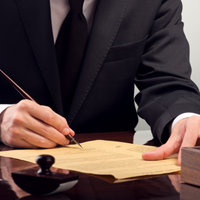 noun: affidavit; plural noun: affidavits
noun: affidavit; plural noun: affidavits
a written statement confirmed by oath or affirmation, for use as evidence in court.
“a former employee swore an affidavit relating to his claim for unfair dismissal”
Origin: mid 16th century: from medieval Latin, literally ‘he has stated on oath’, from affidare.
We are required to sign Affidavits on a regular basis as part of commercial transactions, for FICA purposes, property transactions, court documents and many more. These “written statements made under oath” fulfil an important function and require that they be taken seriously. They need to be compiled and completed with care, read, understood and affirmed with professional care and diligence. To declare incorrect information under oath is perjury and carries a criminal penalty.
A Commissioner of Oaths equally has to take great care in ensuring that a deponent who swears/declares in terms of such a document, is properly identified, fully acquainted with the contents of the document, understands and performs the oath and signs the document in his/her presence.
Affidavits cannot be signed in front of anyone other than a Commissioner of Oaths. They cannot be signed in front of a secretary or by yourself and then afterwards sent or given to a Commissioner to sign as having been the Commissioner without the deponent having been present, identified and declaring the oath.
In a recent Ghostdigest article, Zelda Olivier expands on the responsibilities of Commissioners of Oath as well as the responsibility and functions of Conveyancers
http://www.ghostdigest.com/articles/normal-practice-or-flawed-routines/54918
She writes as follows in regard to Affidavits:
In terms of the Justice of the Peace and Commissioner of Oaths Act 16 of 1963 (the Commissioner of Oaths Act) a Minister may appoint any person or designate the holder of any office as a commissioner of oaths. A list of such persons, which includes an attorney, was published in GN 903 GG 19033/10-7-1998.
Section 7 of the Commissioner of Oaths Act provides:
‘Any Commissioner of Oaths may, within the area for which he is a Commissioner of Oaths, administer an oath or affirmation to or take a solemn or attested declaration from any person: Provided that he shall not administer an oath or affirmation or take a solemn or attested declaration in respect of any matter in relation to which he is in terms of any regulation made under section ten prohibited from administering an oath or affirmation or taking a solemn or attested declaration, or if he has reason to believe that the person in question is unwilling to make an oath or affirmation of such declaration.’
In terms of the regulations made under s 10 of the Commissioner of Oaths Act (GN R1258 GG3619/21-7-1972 (Amended by GN 1648 GG 5716/19-8-1977, GN R1428 GG 7119/11-7-1980 and GN R774 GG8169/23-4-1982)), ‘an oath is administered by causing the deponent to utter the following words: “I swear that the contents of this declaration are true, so help me God,” or in the case of an affirmation: “I truly affirm that the contents of this declaration are true.”
Before a Commissioner of Oaths administers to any person the oath or affirmation prescribed by the regulation he or she shall ask the deponent –
- whether he or she knows and understands the contents of the declaration;
- whether he or she has any objection to taking the prescribed oath; and
- whether he or she considers the prescribed oath or affirmation to be binding on his or her conscience’.
Once the deponent acknowledges and confirms the above, the Commissioner will administer the oath or affirmation, and the deponent will sign the declaration in the presence of the Commissioner of Oaths.
When certifying documents, a copy of a document, which must be certified as a true copy of the original, must be compared with the original document and the Commissioner of Oaths must make sure that the two documents are, in fact, the same.
If the Commissioner of Oaths is sure that the copy is in fact a true copy of the original document and no unauthorised amendments have been made, he or she must stamp that he or she certifies that the document is a true copy of the original document and that there are no indications that the original document has been altered by unauthorised persons. Thereafter, the Commissioner of Oaths must append a signature together with his or her name and designation.
CLICK HERE for an example of a basic Affidavit
Another aspect to bear in mind is that a Commissioner of Oaths may not request or demand payment for performing his/her duty as a Commissioner.
© (Written by Chris Fick & Associates Inc.) No liability can be accepted for any errors or omissions nor for any loss or damage arising from reliance upon any information herein. Always contact your legal adviser for specific and detailed advice. Errors and omission excepted. (E&OE)
